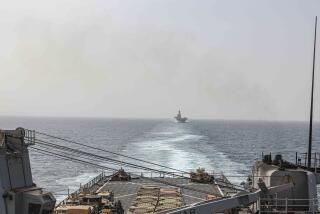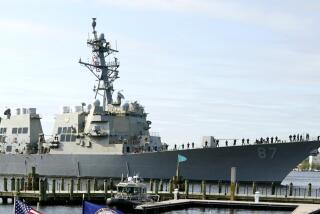International Action a First This Century
- Share via
WASHINGTON — When President Bush decided to halt trade with Iraq as its troops were spilling into Kuwait on the morning Aug. 2, it was the opening move in a strategic contest in which the rules, the stakes and the other players were unknown.
In a world increasingly focused on protecting local and regional interests, the United States risked being the only player willing to bid decisively against Iraq’s Saddam Hussein.
But country by country, the rest of the world has largely fallen in behind the United States. And for the first time in this century, collective international action among normally fractious countries and regions is taking place.
The first countries to follow the U.S. lead were allies Britain and France, which quickly agreed to freeze Iraqi and Kuwaiti assets. The U.N. Security Council added its support by approving a resolution that sharply condemned the invasion.
But the most important collective body in the Arab world, the Arab League, hesitated. Meeting in an emergency session the day after the invasion, the league adjourned without reaching a consensus. Without Arab support, one Security Council member said, further U.N. action was unlikely.
Nonetheless, the European Community agreed to boycott Iraqi oil, despite the hardship it would cause for some of its 12 members. Italy and Spain in particular had just fought long battles against inflation, and the prospect of rising oil prices was sure to squeeze their fragile economies.
But it was Italy, currently chairing the European Community, that made the European announcement. “We will not be satisfied until there is not a single Iraqi soldier in Kuwait,” an Italian Foreign Ministry spokesman said.
Japan, heavily dependent on oil from the Persian Gulf, resisted U.S. pressure for days but finally gave in after a phone call from President Bush, agreeing to join the boycott against Iraqi oil. Even China, whose repression of pro-democracy demonstrations last year had damaged its international standing, decided to halt arms shipments to Iraq.
The situation evolved dramatically again last Monday. For only the second time in its history, the U.N. Security Council adopted a comprehensive trade embargo. Individual moves by separate players suddenly became a phalanx of opposition to Hussein.
Even Turkey and Brazil--faced with severe economic losses from the embargo, climbed aboard. It was not, however, a unanimous stance. Two Security Council members, Cuba and Yemen, abstained from the vote, signaling their opposition to the move.
But Iraq no doubt was stunned as the Soviet Union, once a staunch ally and its largest arms supplier, joined in the Security Council vote. For the first time since World War II, the four main wartime Allies were acting in concert. The next day, several OPEC countries announced they would boost oil production to compensate for embargoed oil from Iraq and Kuwait, mitigating the potential economic damage to oil importing countries. The Arab League, however, remained divided.
On Thursday, U.S. troops were deployed to Saudi Arabia, and U.S. naval vessels took up positions south of the Persian Gulf and in the eastern Mediterranean.
The United States was once again moving ahead of the pack. The decision to organize for a possible blockade went beyond the terms of the U.N. embargo. It was crucial that other countries join the effort, or the United States might appear to be overly aggressive. Only Britain immediately offered to join the force, adding some ships and planes. Other members of the European Community and NATO were biding their time.
The Arab League, meeting in Cairo at another emergency summit, was still divided, despite efforts of Saudi King Fahd and Egypt’s President Hosni Mubarak to forge a pan-Arab military alliance under the banner of the league.
On Friday, that deadlock was broken. Twelve of the league’s 21 members voted to recommend that troops be sent to take part in the defense of Saudi Arabia and any other threatened nation in the Persian Gulf region. Although six members abstained or were absent, only two, Libya and the Palestine Liberation Organization, voted against the measure.
“This appears to be the final break,” said a Western diplomat.
The same day, Australia, Canada and West Germany ordered ships to the region to participate in a possible naval blockade.
On Saturday, the Bush Administration signaled its satisfaction.
“The United States welcomes the participation of so many countries in our joint efforts to fight aggression of Saddam Hussein,” said White House spokesman Marlin Fitzwater. “We expect others to join this group as well.”
More to Read
Sign up for Essential California
The most important California stories and recommendations in your inbox every morning.
You may occasionally receive promotional content from the Los Angeles Times.













